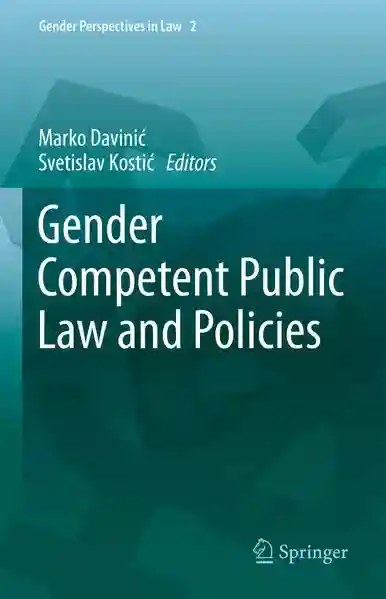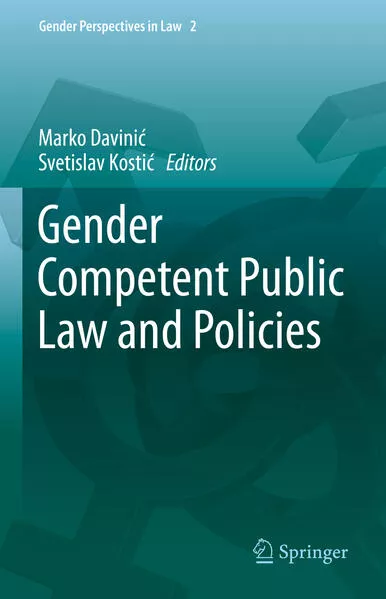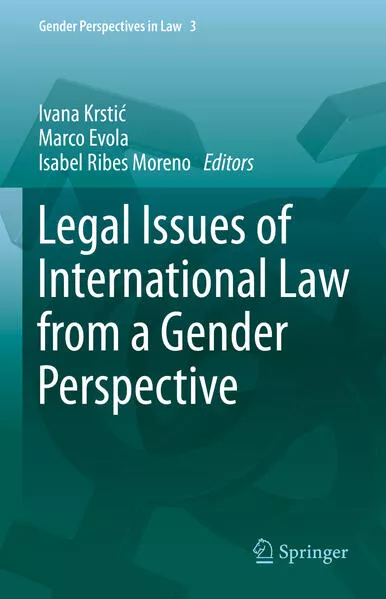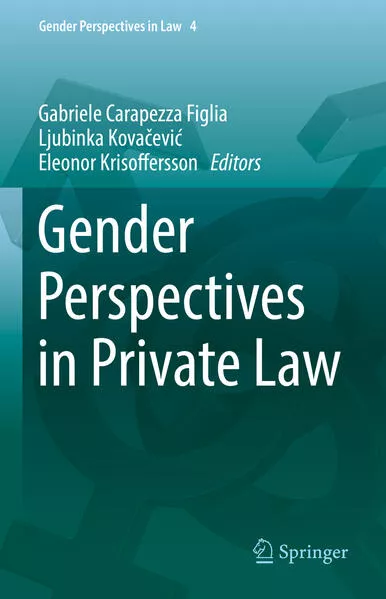Chronologie aller Bände (1 - 3)

Die Reihenfolge beginnt mit dem Buch "Gender Competent Public Law and Policies". Wer alle Bücher der Reihe nach lesen möchte, sollte mit diesem Band von Marko Davinić beginnen. Der zweite Teil der Reihe "Legal Issues of International Law from a Gender Perspective" ist am 13.03.2023 erschienen. Die Reihe umfasst derzeit 3 Bände. Der neueste Band trägt den Titel "Legal Issues of International Law from a Gender Perspective".
- Anzahl der Bewertungen für die gesamte Reihe: 0
- Ø Bewertung der Reihe: 0
- Start der Reihe: 19.01.2023
- Neueste Folge: 02.03.2024
Diese Reihenfolge enthält 3 unterschiedliche Autoren.
- Autor: Davinić, Marko
- Anzahl Bewertungen: 0
- Ø Bewertung:
- Medium: Buch
- Veröffentlicht: 19.01.2023
- Genre: Politik
Gender Competent Public Law and Policies
This book offers a new perspective on public law and public policies. The collection of papers gathered here begins with an in-depth discussion on gender perspectives in constitutional law, which can support gender justice, but also perpetuate patriarchal norms. The book then analyzes the role of the European Ombudsman in the area of gender discrimination. Despite its limited jurisdiction, this institution has become a significant complementary tool in the protection of gender equality and the elimination of gender discrimination at the EU level. Particular attention is paid to the importance of mainstreaming gender into public policies. Thus, the legal and institutional frameworks of Spain and Serbia are presented, which can serve as an inspiration to other countries. Another important aspect covered in the book is an analysis of systemic differences between the average wages of women and men in the six countries of the Western Balkans. In turn, the book presents a discussion on female genital mutilation as a highly gendered crime based on extreme versions of rigid, patriarchal ethnic and religious norms and customs. It is analyzed through the lenses of the Istanbul Convention, as a tool for combating violence against women. Particular attention is paid to femicide, its definitions, forms, and phenomenological characteristics. Having been only recently acknowledged, femicide is still characterized by an inadequate judicial response in many countries. In this regard, a special focus is on German and Serbian experiences in acknowledging femicide and combating it through various measures. Finally, the importance of stalking laws is discussed, as stalking is a highly gendered crime that many states fail to combat adequately. The collection of essays offered in this book will be of interest to all those working in the field of public law, to policymakers, and to students and academics looking to broaden and deepen their research on various issues in public law and policies from gender perspectives.
- Autor: Krstić, Ivana
- Anzahl Bewertungen: 0
- Ø Bewertung:
- Medium: Buch
- Veröffentlicht: 13.03.2023
- Genre: Politik
Legal Issues of International Law from a Gender Perspective
This book offers a new perspective on international law, which was, for centuries, male-dominant and gender-blind. However, this gender blindness has led to many injustices, the failure to recognize certain rights, and to impunity for serious crimes. The book examines the development of gender perspectives in various branches of international law, while also discussing and explaining certain universal standards. However, particular attention is paid to the European human rights system.
Accordingly, the book provides detailed explanations of the EU’s external policies in relation to sex, sexual orientation, and gender identity. Also, there is a special focus on the relevant jurisprudence of the European Court of Human Rights in relation to gender and sexual orientation, female reproduction, and sexuality. The authors explain not only the importance of an adequate legal framework for combating gender inequality but also the detrimental effects of deeply rooted gender stereotypes and prejudices. Subsequently, the development of particular branches is presented, such as a gender-sensitive approach to the prevention of war crimes, gender perspectives in refugee law, and the evolution of gender-sensitive environmental law. In addition, the problematic situation of discrimination in the workplace is addressed from various perspectives. Many discussions, especially among EU member states, are reserved for the issue of women’s participation in managerial boards, while the growing awareness of gender equality in international trade agreements represents another interesting topic. Lastly, the book offers a historical perspective on the development of international law in the interwar period, with a particular focus on the situation in Yugoslavia.
The book critically reconsiders the dominant molds of legal knowledge and presents innovative gender-sensitive and gender-competent insights on a variety of issues in international law, in order to introduce readers to new research topics relevant to gender equality and to stimulate the development of an international legal and institutional framework for achieving greater gender equality in practice. The collection of essays presented here will be of interest to all those working in the field of international law, as well as students and academics looking to broaden and deepen their research on a range of issues in international law from gender perspectives.
- Autor: Carapezza Figlia, Gabriele
- Anzahl Bewertungen: 0
- Ø Bewertung:
- Medium: Buch
- Veröffentlicht: 17.03.2023
- Genre: Politik
Gender Perspectives in Private Law
This book discusses prominent and controversial gender-related issues across the fields of family law, tort law, labour law, civil procedure law, ADR and private international law. An important critical assumption made by the authors is that the gender equality perspective has been largely neglected in several branches of private law, since scholars researching the intersection between gender and legal studies are mostly focused on public law and human rights law. In light of that, the book contributes not only to the deconstruction of gender-blind private law, but also to the development of a gender-competent analysis of the key branches of private law, starting with private international law.
Gender perspective in family law is analyzed on the basis of gendered and heteronormative operations of family law with reference to the formation of legally recognized relationships, the establishment of legal parenthood, the division of marital property after a divorce, and the arrangements for post-separation parenting. Also, regulation of family matters in Indian society and the gender equality perspective from the principle of the child’s best interest are considered. As far as tort law is concerned, the book addresses compensation for damages suffered by women performing unpaid household work. Further, it contains papers dedicated to the following labour law issues: the genesis of labor law and its capacity to contribute either to worsening gender inequality in the world of work or to promoting gender equality; gender segregation in the labour market and its connection to family-friendly policies in the European Union; sexual harassment at work; and the impact of work digitalization on gender-related labour law issues. Lastly, the authors analyze gender equality in civil procedural law, as well as in mediation as a tool for encouraging the peaceful settlement of disputes. The book is intended to improve awareness of the wide range of private law issues that are important for understanding the ways in which gender inequality shapes everyday experiences, while also presenting critical considerations of the key private law instruments for achieving gender equality.


